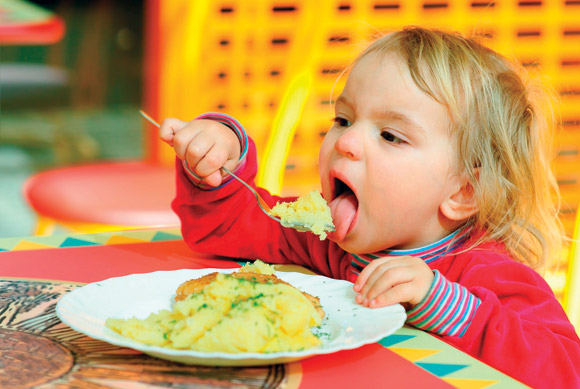Tips to Help Your Baby Start Self Feeding
As your child enters the second year of his life, he will be more interested in doing things all by himself. This is definitely a healthy part of a normal child’s development and as he grows, he can learn to do more tasks all by himself. Parents can help young children become independent by encouraging them to take the responsibility whenever possible. Self feeding is a great way to encourage independence in children. According to American Academy of Pediatrics most babies are ready to try self feeding around 10- 12 months.

Learning to eat can be a messy thing and it can be frustrating for parents to deal with the kids who start to play with the food instead of eating it. But don’t be afraid of it as it is part of the development process and is also important for fine motor skills. Here are a few interesting tips that can make your task easier.
Finger feeding: Initially you will observe that children will grasp for the food and try to put the whole hand into their mouth. Slowly they will use their fingers to pick up foods. Make sure to give things like puffs that are dry and can be picked up easily, but not big that can choke them. You can also offer them crunchy foods like breadsticks, rice cakes that are idea finger foods. Give them the opportunity to try again and again and they will learn.
Cutlery: Choose cutlery that are chunkier and attractive. This will encourage them to sit with their food. Even if they do not feed themselves, at least they will love to chew and bang the spoons and plates.
Serve food that your child loves: Once you have noticed that your child is interested in self feeding, try to identify the items that he loves to eat. Offer those items in proper size so that he tries to eat on his own.
Good role modeling: To encourage our child to feed on his own, try to sit with the entire family together. This will give him an opportunity to see others using cutlery and feeding themselves and of course inspire him to be big like Mom and Dad.

Give lots of practice: Practice makes a man perfect is a common saying. Help your child to hold the spoon and how to put the food into his mouth. Let him try again and again as regular practice will help him to learn the skills easily.
Supervise and praise your child: It is very important to supervise your baby for any signs of choking or allergic reactions. Many foods can cause allergies like itchy red skin rashes, diarrhea, vomiting and etc. Some foods like carrots, grapes, pop corns also pose choking hazard. Try to keep your patience and be sure to applaud every successful attempt that your little one makes.
Summary
A little encouragement from your side can help your child to become more independent. When it comes to self feeding, help him to start with finger foods and slowly introduce spoon and forks. Help him to practice more and gain confidence in his ability to try new things.


































